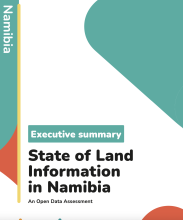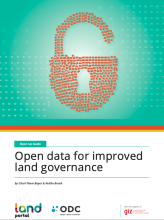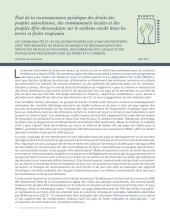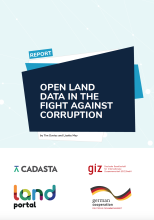Land Library Search
Through our robust search engine, you can search for any item of the over 73,000 highly curated resources in the Land Library.
If you would like to find an overview of what is possible, feel free to peruse the Search Guide.
/ library resources
Showing items 1 through 9 of 40.Land corruption seriously threatens efforts to fight climate change and achieve a fair energy transition. By undermining climate programmes, projects and practices, it fuels increased carbon emissions and negative climate outcomes.
This is a brief summary of the State of Land Information in Namibia report. The SOLI Namibia reports serves as a diagnostic for the land information ecosystem in Namibia and enable targeted interventions for improved information management at a later stage.
The Open Up Guide on Land Governance is a resource aimed to be used by governments from developing countries to collect and release land-related data to improve data quality, availability, accessibility and use for improved citizen engagement, decision making and innovation.
Les Open Up Guides sont des outils pratiques développés par l’ODC et ses partenaires thématiques pour aider les gouvernements et d’autres acteurs à utiliser la publication d’ensembles de données stratégiques pour relever les principaux défis politiques.
L’étude a analysé dans 31 pays l’état de la reconnaissance juridique des droits des peuples autochtones, des communautés locales et des populations afro-descendantes sur le carbone présent sur leurs terres et territoires.
This article discusses the inherent limitations of law in transitional justice processes regarding land grievances. Through analysis of the case of Timor-Leste (East Timor), a country marked by post-colonialism, post-authoritarianism, and post-conflict.
From 9th to 29th September 2019, Land Portal, Cadasta and GIZ co-hosted an online discussion focussing on the role of open land data in the fight against corruption.
The Afghanistan land sector is plagued by a multitude of problems linked to weak governance, corruption and lack of capacity. There are competing claims to land, widespread conflicts, resultant landlessness and poverty.
This brief note identifies the consequences of land acquisitions in peri-urban spaces around the cities of Bamako and Ségou, Mali.






